Self Hosted Alternatives to Notion
- AFFiNE: Combines documents, whiteboards, and databases with local-first architecture. Features AI assistance, templates, and community-driven updates. Ideal for teams needing data security and flexibility.
- SiYuan: A personal knowledge management tool with block-based storage, bi-directional links, and Markdown support. Great for organizing research and technical documentation.
- AnyType: A decentralized workspace that syncs directly between devices. Offers object-based organization, end-to-end encryption, and offline-first design.
- XWiki: An enterprise-grade wiki with advanced customization, real-time collaboration, and robust security features. Perfect for large-scale knowledge management.
- Docmost: A lightweight team documentation system with real-time collaboration, nested pages, and Markdown support.
Quick Comparison
| Feature | AFFiNE | SiYuan | AnyType | XWiki | Docmost |
|---|---|---|---|---|---|
| Core Approach | Local-first, open-source | Personal knowledge mgmt | Decentralized workspace | Enterprise wiki | Team documentation |
| AI Assistance | Yes | No | No | No | No |
| Collaboration | Real-time | Limited | Peer-to-peer | Real-time | Real-time |
| Customization | Moderate | Moderate | High | High | Limited |
| Hosting Requirements | 1 GB RAM, 20 GB storage | 1 GB RAM, 20 GB storage | 2 GB RAM, 25 GB storage | 4 GB RAM, 40 GB storage | 1 GB RAM, 10 GB storage |
| Best For | Teams | Individuals | Creative professionals | Enterprises | Small teams |
If you’re prioritizing data privacy, cost control, and full ownership of your information, these tools are worth exploring. AFFiNE stands out for its balance of features, ease of use, and community support.
5 Self-Hosted Notion Alternatives: Run Your Own Knowledge …
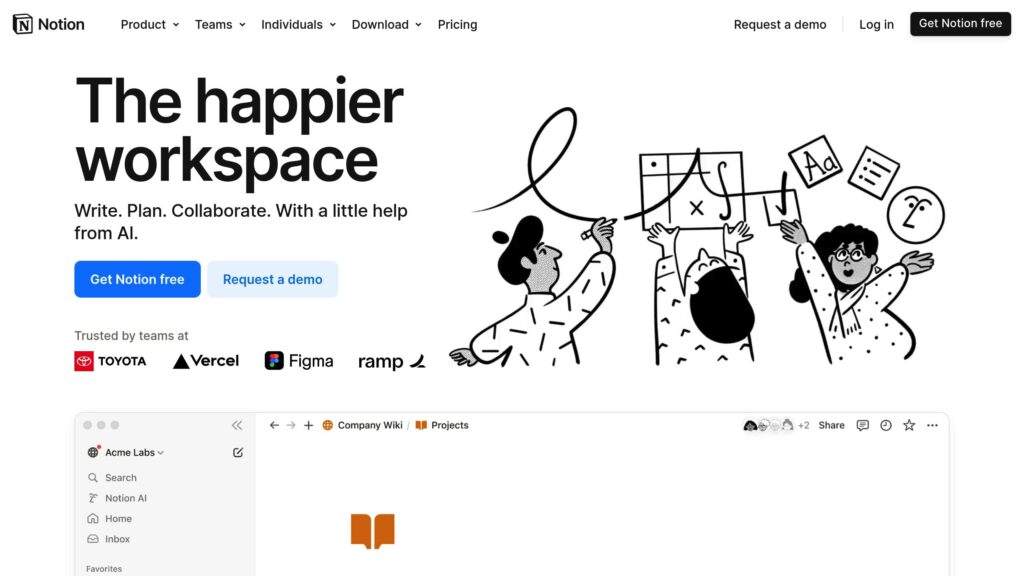
1. AFFiNE: Open-Source Knowledge Base
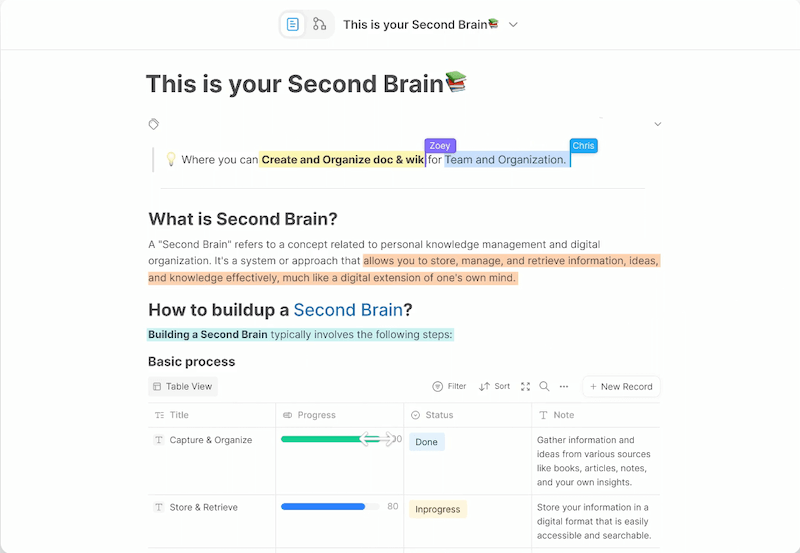
AFFiNE is a self-hosted alternative to popular note-taking platforms, designed to combine writing, drawing, and planning in one place. With its focus on complete data control, it allows teams to handle complex projects without the need to switch between multiple apps.
Here’s what makes AFFiNE stand out:
| Feature | What It Offers |
|---|---|
| Local-First Architecture | Full control over data storage and security |
| Edgeless Mode | A seamless workspace for linking knowledge across pages |
| AI Assistance | Boosts productivity for creating and organizing content |
| Ready-to-Use Templates | Quick setup for different project needs |
| Community-Driven Development | Regular updates based on user feedback |
These features make AFFiNE a strong choice for organizations looking for a secure and efficient knowledge management tool.
Dan Charles, CEO of The Keyman Group, shared his experience with AFFiNE:
“Really impressed with how AFFiNE is able to streamline our team’s workflow and improve productivity. Switch between different modes to write, draw, and plan all in one place and with data security which we are most concerned about. It makes everything easy.” – Dan Charles, CEO – The Keyman Group [1]
AFFiNE is also budget-friendly. It’s free for individual use, with flexible licensing options for teams. Hosting it on your own VPS can further reduce costs and keep your data secure.
The platform’s open-source model has attracted a community of over 4,000 members who actively contribute and provide support. As one user puts it:
“AFFiNE is an open source that is close to its community and filled with useful features. I use edgeless mode to connect all my knowledge to a single page.” – Eliot, Student [1]
2. SiYuan: Personal Knowledge Management
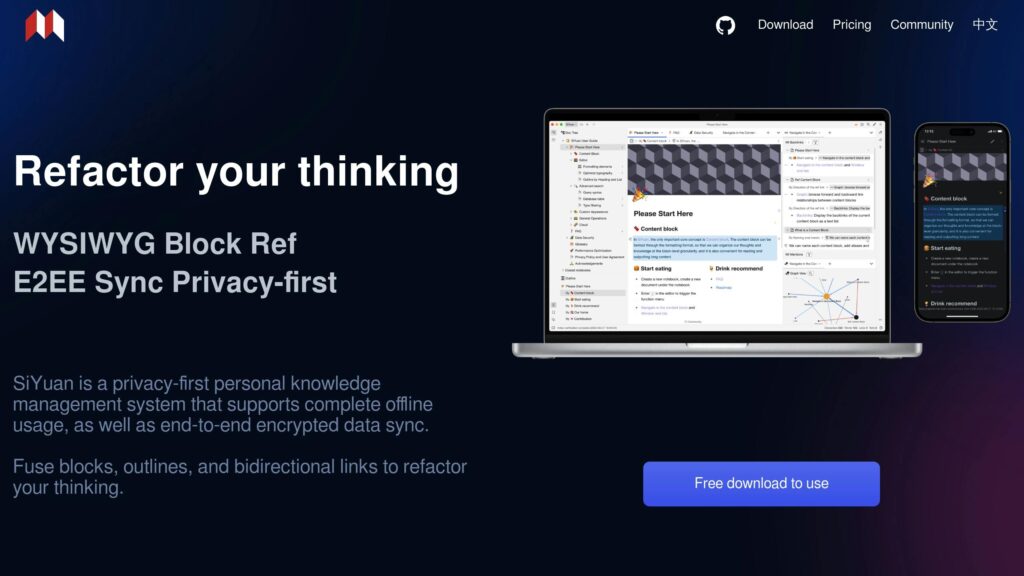
SiYuan is a knowledge management system designed to give users full control over their data while offering powerful organization tools. Its setup ensures a secure, self-contained environment ideal for managing personal and professional information. Here’s a closer look at its technical features and how it performs when self-hosted.
| Feature Category | Capabilities |
|---|---|
| Data Structure | Block-based storage, bi-directional links, document tree |
| Search Functionality | Full-text search, SQL queries, custom filters |
| Content Creation | Markdown editor, math equations, code blocks |
| Organization | Custom attributes, dynamic references, hierarchical folders |
| Integration | REST API, WebDAV support, custom themes |
SiYuan’s block-based system is especially effective for organizing complex information. It works well for technical documentation, research notes, and project management, thanks to its structured data approach.
Self-hosting SiYuan adds even more advantages:
- Local Processing: All data is processed directly on your server, leading to faster response times.
- Custom Backup Rules: Set up automated backup schedules that fit your needs.
- Resource Allocation: Assign server resources based on how you use the platform.
For those handling sensitive information, SiYuan includes strict access controls and encryption. Its block-reference system allows users to build detailed knowledge networks while keeping data secure.
System Requirements for Self-Hosting
The platform has modest system requirements, making it accessible for a wide range of users:
| Resource | Minimum Requirement |
|---|---|
| CPU | 1 virtual core |
| RAM | 1 GB |
| Storage | 20 GB |
| Bandwidth | 100 Mbps |
These requirements align well with entry-level VPS setups, so you can start small and scale as needed. SiYuan’s efficient use of resources means it can run alongside other self-hosted apps without causing performance issues.
Content Organization Features
SiYuan offers tools to keep your content well-organized:
- Automated Daily Notes: Simplify journaling and daily updates.
- Graph View: Visualize connections between pieces of information.
- Custom Attributes: Use tags and filters for better organization.
- Predefined Templates: Standardize content creation with ready-to-use formats.
SiYuan’s focus on privacy and its local-first design make it a solid option for users who want complete control over their data without sacrificing collaboration tools.
3. AnyType: Decentralized Workspace
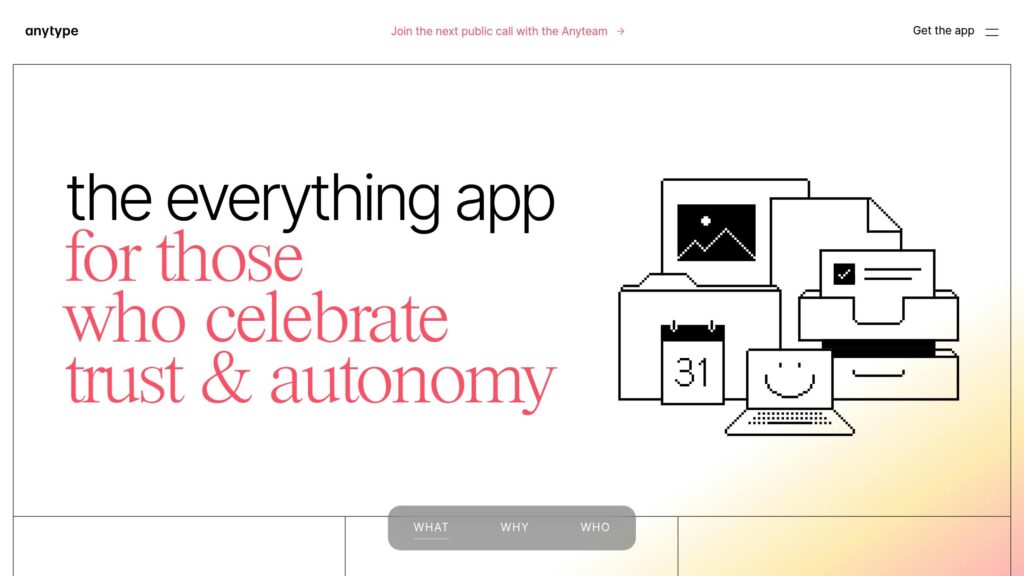
AnyType offers a new way to manage personal knowledge with decentralized data storage and workspace organization. Unlike traditional cloud-based tools, it uses a peer-to-peer network, giving users full control over their data while still allowing collaboration.
Core Architecture
AnyType is designed with a decentralized framework, focusing on local data processing and secure synchronization. Its main architectural components include:
| Component | Description |
|---|---|
| Storage Protocol | Peer-to-peer decentralized network protocol |
| Data Format | Object-oriented structure with defined links |
| Sync Method | Direct synchronization between devices |
| Access Control | Encryption-based for secure data handling |
Resource Requirements
AnyType is lightweight and can run on modest VPS setups. While resource needs may vary, a typical self-hosted instance requires:
| Resource | Recommended Minimum |
|---|---|
| CPU | 2 vCores |
| RAM | 2 GB |
| Storage | 25 GB NVMe (or equivalent) |
| Network | 1 Gbps |
These requirements make it affordable to host AnyType alongside other applications on the same VPS.
Key Features
What sets AnyType apart is its unique way of organizing and managing data:
- Object-Based Structure: Information is stored as interconnected objects, not static files.
- Offline-First Design: Local processing ensures quick access and better privacy.
- Cross-Device Sync: Data syncs directly between devices without central servers.
- Custom Object Types: Users can create personalized data structures and relationships to suit their needs.
Security Highlights
Security is a core focus of AnyType, relying on several key principles:
- End-to-End Encryption: Data is encrypted on your device before syncing, keeping it private.
- Identity Management: Cryptographic methods verify identities, reducing dependence on traditional login credentials.
- Granular Access Control: A detailed permissions system allows precise control over data sharing and collaboration.
Hosting AnyType on your own VPS adds another layer of security and flexibility.
Integration Options
AnyType’s API allows seamless integration with other tools, enabling users to build automated workflows and custom extensions. This modular setup supports scalability as your needs grow, while maintaining the security benefits of self-hosting.
For organizations managing sensitive information, AnyType’s decentralized design ensures data stays under your direct control within your VPS environment, offering additional security and compliance advantages.
sbb-itb-0ad7fa2
4. XWiki: Enterprise Wiki Platform
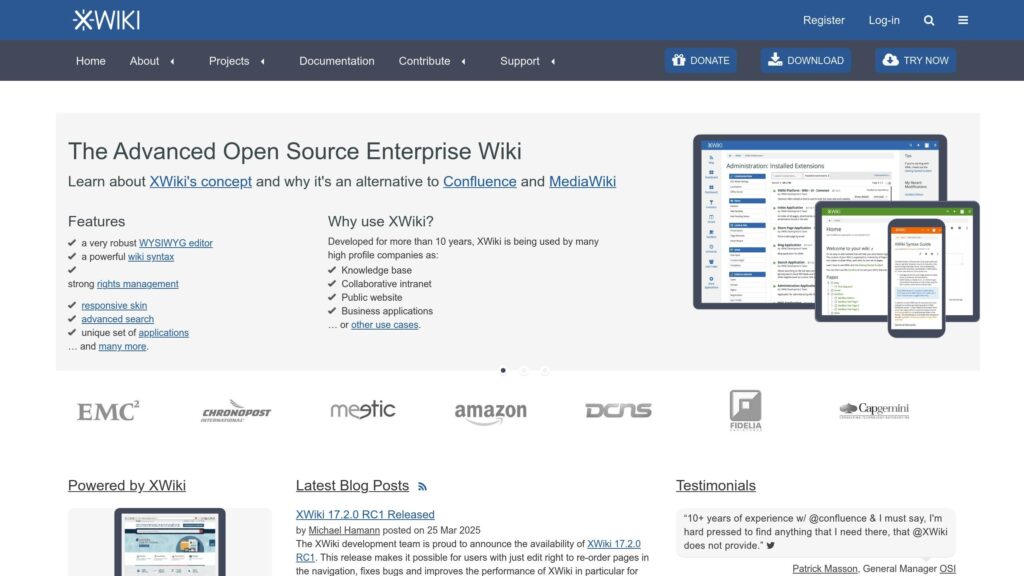
XWiki is a powerful wiki platform designed for businesses needing scalable knowledge management. It offers extensive customization options alongside enterprise-level security and performance.
Enterprise Features
XWiki is built around three main areas of functionality:
| Feature Category | Key Components |
|---|---|
| Content Management | Document hierarchy, version control, multi-format export |
| Collaboration | Real-time editing, commenting, rights management |
| Integration | REST API, database connectors, LDAP/Active Directory |
These features are designed to handle large-scale operations efficiently.
Resource Requirements
For optimal performance when self-hosted, XWiki recommends the following setup:
| Resource | Recommended Specification |
|---|---|
| CPU | 4 vCores |
| RAM | At least 4 GB |
| Storage | 40 GB SSD |
| Database | MySQL 8.0+ or PostgreSQL 12+ |
| Java | OpenJDK 11 or 17 |
This configuration ensures smooth operation and reliable performance.
Advanced Customization
XWiki is highly flexible, making it ideal for enterprises with specific needs:
- Quick App Creation: Build custom applications without writing code.
- Scripting Support: Use Groovy, Python, or Ruby to expand functionality.
- Template Engine: Create tailored document structures.
- Skinning System: Customize the interface to match your brand.
Security Architecture
XWiki employs multiple layers of security to protect your data:
Authentication Options:
- LDAP/Active Directory integration
- OAuth providers
- Two-factor authentication
- Custom authentication solutions
Authorization Controls:
- Document-level permissions
- Space-level rights
- Global role management
- Customizable rights profiles
Data Protection Measures:
- Encrypted storage
- Automated backups
- Audit logs
- Session management tools
Performance Optimization
XWiki is designed for high performance and scalability, with features like:
- Caching System: Multi-level caching to reduce database strain.
- Search Engine: Built-in Solr for fast content indexing.
- Database Optimization: Streamlined queries and connection pooling.
- Load Balancing: Support for horizontal scaling to handle increased demand.
Its modular design allows businesses to start small and expand as needed. XWiki’s resource-friendly setup works well on modern VPS infrastructure, enabling you to host multiple applications simultaneously without compromising efficiency. It’s a smart addition to any self-hosted toolset, offering both flexibility and reliability.
5. Docmost: Team Documentation System
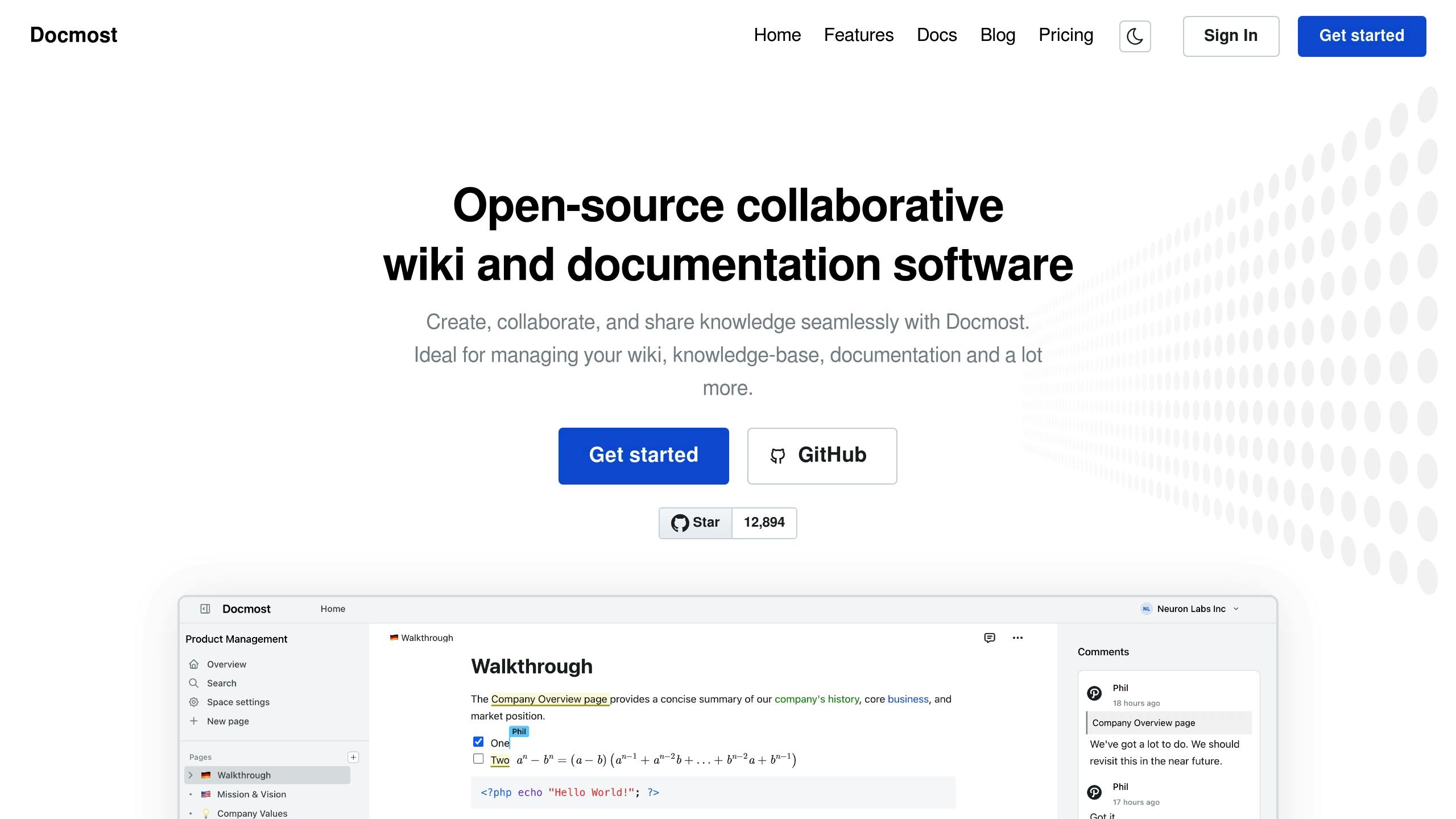
Docmost is a simple, real-time tool for team documentation that makes knowledge sharing easy and keeps everything organized. Its lightweight design runs smoothly on basic hardware, which means you can host multiple applications on a single VPS without breaking the bank.
Here are some standout features:
- Document organization with nested pages and revision history
- Real-time collaboration, including inline comments
- Customizable access controls for teams and permissions
- Markdown support and API integrations
Check out our step-by-step AFFiNE setup guide to see how self-hosting works in practice.
Feature Comparison
Here’s a closer look at how these self-hosted Notion alternatives stack up:
| Feature | AFFiNE | SiYuan | AnyType | XWiki | Docmost |
|---|---|---|---|---|---|
| Core Approach | Local-first, Open-source | Personal knowledge management | Decentralized workspace | Enterprise wiki platform | Team documentation system |
| AI Assistance | Yes – Includes tools for writing, drawing, and planning | – | – | – | – |
| Integrated Tools | Combines docs, whiteboards, and databases | – | – | – | – |
This table highlights the key strengths of each platform, helping you identify the best fit for your needs. AFFiNE stands out with its combination of features and efficient resource use.
By self-hosting, you can manage multiple apps on a single VPS, reducing costs while maintaining full control over your data. Hosting multiple instances at the same time makes it a smart choice for individuals and teams aiming to get the most out of their infrastructure.
Up next: a step-by-step guide to setting up AFFiNE for self-hosting.
Step-by-Step AFFiNE Setup Guide on VPS

This guide walks you through setting up AFFiNE on your VPS, giving you full control over your installation while keeping it secure and cost-effective.
System Requirements
To get started, ensure your VPS meets these requirements:
- Memory: At least 1 GB RAM (2 GB is better)
- Storage: 20 GB of available space
- Software: Docker and Docker Compose installed
- Operating System: Ubuntu 20.04 LTS or newer
Installation Steps
1. Update Your System
Run the commands below to update your system and install Docker:
sudo apt update && sudo apt upgrade -y sudo apt install docker.io docker-compose -y
2. Set Up Docker Configuration
Create a directory for AFFiNE and set up the Docker configuration file:
mkdir affine-docker && cd affine-docker nano docker-compose.yml
Paste this configuration into the file:
version: '3.8'
services:
affine:
image: ghcr.io/toeverything/affine:latest
ports:
- "3000:3000"
volumes:
- ./data:/app/data
restart: unless-stoppedSave and close the file.
3. Start AFFiNE
Launch AFFiNE using Docker Compose:
docker-compose up -d
Once the service starts, you can move on to securing and customizing your setup.
Post-Installation Configuration
Access AFFiNE in your browser at http://your-vps-ip:3000. To improve security, set up a reverse proxy using tools like Nginx or Apache, secure it with a Let’s Encrypt SSL certificate, and link it to a custom domain.
Resource Management
Here’s a quick look at typical resource usage for a VPS with 1 vCore and 1 GB RAM:
- Memory: 200–300 MB
- Storage: Around 500 MB after installation
- CPU: 5–10% during normal use
Optimize resources and keep your data safe with regular maintenance and backups.
Backup Strategy
Protect your data by routinely backing up the /data directory:
# Create a backup tar -czf affine-backup-$(date +%Y%m%d).tar.gz ./data # Move the backup to a secure location mv affine-backup-*.tar.gz /backup/
Troubleshooting Tips
If you encounter any issues, these commands may help:
# Check logs docker-compose logs -f affine # Restart the service docker-compose restart affine # Monitor resource usage docker stats affine
This setup ensures a reliable and efficient AFFiNE installation. Adjust the configuration as needed to fit your specific requirements.
Summary and Recommendations
Here’s a quick rundown of the best self-hosted Notion alternatives and what makes each stand out.
AFFiNE is a strong choice for individuals and small teams. Its local-first design ensures complete control over your data. Plus, with over 4,000 active members on Discord, it has a supportive community and a user-friendly interface.
Feature-Based Recommendations
| Use Case | Recommended Solution | Key Features |
|---|---|---|
| Personal Knowledge Management | SiYuan | Local storage, powerful linking |
| Team Collaboration | AFFiNE | Real-time collaboration, Kanban |
| Enterprise Wiki | XWiki | Scalable and highly customizable |
| Document Management | Docmost | Structured docs, version control |
| Creative Teams | AnyType | Decentralized storage, flexibility |
These tools cater to a variety of needs, from personal use to enterprise-level setups. Each platform serves a specific purpose, as outlined earlier.
For hosting, even a basic VPS with 1 vCore and 1 GB RAM (around $10/month) can handle AFFiNE for small teams. Larger setups may require 2–4 GB of RAM for smoother performance.
Self-hosted solutions are becoming a go-to for organizations focused on security. Dan Charles, CEO of The Keyman Group, highlights this trend:
“Really impressed with how AFFiNE is able to streamline our team’s workflow and improve productivity. Switch between different modes to write, draw, and plan all in one place and with data security which we are most concerned about. It makes everything easy.” [1]



